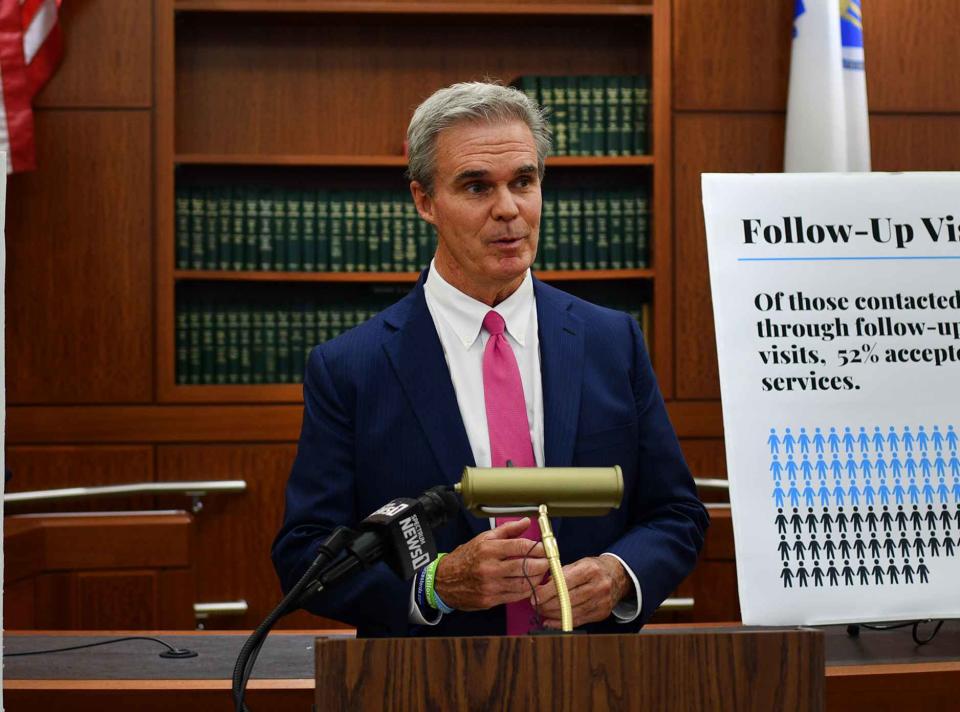Early: Recovery is possible — and should be celebrated
- Oops!Something went wrong.Please try again later.
Recovery is possible. Recovery should be celebrated.
Usually when we talk about the opioid epidemic, we talk about the grimmest statistics – the overdose deaths. It’s hard not to when this disease claimed nearly 108,000 lives in this country last year. We talk about the lives lost and the families destroyed.
While we won’t forget about those lost, we also need to remember those who are here, working on their recovery each and every day.

During Recovery Month in September, I spent time visiting all of the peer recovery resource centers in our county, speaking to those in recovery, recognizing their success, and truly appreciating the hope they give to those suffering.
We want to focus on those in all stages of recovery. And it is truly cause for celebration.
Here’s a statistic you don’t hear too often when we’re talking about addiction: 75% of those with substance-use disorder achieve recovery. Recovery is not just possible, it is common.
That is a huge majority of people who are successfully overcoming the disease of addiction. We should be celebrating success more and stigmatizing less.
When I hear that 75% number, I’m given hope.
Recovery begins with hope. As Theodore Roosevelt once said, “Believe you can and you’re halfway there.”
We know addiction is a disease that rewires the brain, changing the way people think and make decisions focusing only on getting more of the drug. We also know that many people started their addiction with legally prescribed pain medications after a sports injury, an impacted wisdom tooth or a surgery.
The disease is so powerful that relapse is common. It often takes several attempts to achieve recovery.
The national Substance Abuse and Mental Health Services Administration defines recovery as “a process of change through which individuals improve their health and wellness, live self-directed lives and strive to reach their full potential.”
I love this definition because it includes all stages of recovery.
I would encourage those in early recovery or those who may have suffered a relapse to hold onto the hope and feeling that made you seek treatment for the first time. Or the hope that made you go back for a second or a third time.
For those who haven’t personally experienced addiction, I’d encourage you to recognize that relapse is part of this very complex disease of the brain and withhold judgement. It is different for everyone.
Addiction is a community problem and requires a community solution. It is up to all of us to share successes, for those in recovery to tell their stories, and to help remove the stigma around addiction.
Stigma prevents those suffering from the disease of addiction from getting the help and treatment they need and deserve. But stigma also prevents those in recovery from living their lives to the fullest. Those in recovery often face stigma while seeking employment and housing, and that’s not right.
No person should be defined only by their disease. It is not who they really are. Also, if we want people to get better, we need to help them achieve the sense of stability and purpose a good job and permanent home can provide.
Sam Quinones, author of “Dreamland,” tells us the opposite of addiction is community. Building community connections and supporting one another helps us all ease suffering.
Building a community where people are embraced, respected and supported by their peers gives us all hope.
Through that vision of hope, we can see an end to the scourge of addiction.
Joseph D. Early Jr. is the Worcester County district attorney.
This article originally appeared on Telegram & Gazette: Worcester County district attorney Joseph D. Early Jr. on recovery

